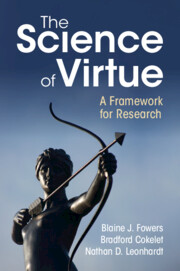Book contents
- The Science of Virtue
- The Science of Virtue
- Copyright page
- Contents
- Acknowledgments
- Introduction
- Part I Philosophical Resources and Prospects
- Chapter 1 Virtue Theory
- Chapter 2 A Philosophically Informed Virtue Science
- Part II Psychological Resources and Prospects
- Part III Organizing Virtue Research with the STRIVE-4 Model
- Part IV The Science and Practice of Virtue
- References
- Index
Chapter 1 - Virtue Theory
from Part I - Philosophical Resources and Prospects
Published online by Cambridge University Press: 11 January 2024
- The Science of Virtue
- The Science of Virtue
- Copyright page
- Contents
- Acknowledgments
- Introduction
- Part I Philosophical Resources and Prospects
- Chapter 1 Virtue Theory
- Chapter 2 A Philosophically Informed Virtue Science
- Part II Psychological Resources and Prospects
- Part III Organizing Virtue Research with the STRIVE-4 Model
- Part IV The Science and Practice of Virtue
- References
- Index
Summary
Empirical virtue researchers have not generally relied on robust virtue theory. Without a unifying theory of virtue, scientific studies have developed without guidance, and the result is a patchwork of relatively disconnected studies of specific virtues based on ad hoc assumptions about those virtues. Therefore, this chapter presents an ecumenical, realistic virtue theory as a conceptual foundation for empirical research in virtue science. It suggests that moral virtues are (1) acquired traits that are (2) manifested in behavior, (3) steered by knowledge, and (4) fully motivated. The virtue theory presented is inspired by philosophic work (primarily Aristotle and Confucius), but it does not engage in the contentious debates active in philosophical approaches to virtue, leaving aside the debates about the nature and importance of ideal human virtue and focusing on the ordinary virtues that are often ascribed to people who are morally good. We also discuss the important role of culture in virtue definition. Finally, we outline the four components of virtue: (1) behavior, (2) cognition, (3) emotion/motivation, and (4) practical wisdom.
- Type
- Chapter
- Information
- The Science of VirtueA Framework for Research, pp. 25 - 52Publisher: Cambridge University PressPrint publication year: 2024



